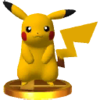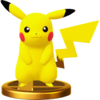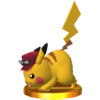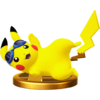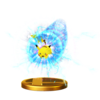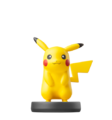Pikachu (SSB4)
| Pikachu in Super Smash Bros. 4 | |
|---|---|
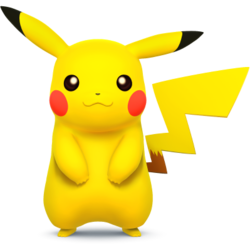 
| |
| Universe | Pokémon |
| Other playable appearances | in SSB in Melee in Brawl in Ultimate |
| Availability | Starter |
| Final Smash | Volt Tackle |
| Tier | B (15) |
Pikachu (ピカチュウ, Pikachu) is a playable character in Super Smash Bros. 4. Its return to the series was announced during the E3 Nintendo Direct on June 11th, 2013.[1] It was also among the first wave of amiibo that are compatible with SSB4. Ikue Ōtani reprises her role as Pikachu's voice actress, albeit via recycled voice clips from Super Smash Bros. Melee and Super Smash Bros. Brawl.
Pikachu is ranked 15th out of 54 on the tier list, placing it in the B tier. This is a slight drop from its placement in Brawl, where it was ranked 8th out of 38. Pikachu boasts fast overall speed, an excellent approach, good neutral and combo games, and an excellent recovery. However, it is burdened with poor endurance and very unimpressive KO potential. As a result, Pikachu has a high learning curve and minimal high-level representation compared to other high-tier characters, but it has nonetheless achieved notable tournament results, mostly thanks to ESAM.
The competitive community's overall opinion of Pikachu has been volatile since SSB4's release. Initially, it was widely seen as an average character, but after a number of impressive tournament showings by ESAM, including his brief period of retirement having added to the "mystery" of Pikachu's potential, it was seen as a top 3 character by players like ZeRo and ESAM himself. Incidentally, this perception was further cemented after ZeRo and ESAM competed against each other in an extremely close Winners' Finals set at Super Smash Con.
Sometime after this, public opinion on Pikachu's viability swayed again. Many considered Pikachu's ranking on the first official tier list to be far too high, which was reflected with its lower placement within the second tier list due to metagame development, ESAM's inconsistent showings at major tournaments, a dearth of results for Pikachu at national, regional, and even local levels of play, and downloadable content and/or game updates resulting in newfound high-tier and top-tier characters. Although update 1.1.5 nerfed some of Pikachu's most difficult matchups, its current ranking on the tier list is still disputed even after its placement drop, with many players believing that Pikachu should be ranked even lower.
Attributes
As in previous installments, Pikachu is a small, agile lightweight. It has fast walking and dashing speeds, average falling speed, above average gravity, and fast air acceleration, but slow air speed. Pikachu also has a quick jumpsquat that lasts for 4 frames, average traction, and a relatively long initial dash that lasts for 14 frames. These three particular attributes grant it a moderately long perfect pivot, but also result in its dash dance and fox-trot being slow and extended. Unsurprisingly, Pikachu is also capable of crawling and wall jumping.
Pikachu's arguably greatest strength is its flexible approach. Quick Attack is an excellent mobility option, and due to consisting of two hits, it allows Pikachu to weave in and out of danger, play mindgames, and initiate combos. Quick Attack can also be edge-canceled, granting even faster movement with the aid of platforms. With this technique, Pikachu can chase opponents and maintain pressure without facing significant retaliation. Thunder Jolt is a useful projectile and has good utility for zoning or forcing approaches. When coupled with its fast walking and dashing speeds, short hop, and useful pivot, Pikachu possesses an overall strong neutral game.
Another advantage Pikachu has is its frame data. Most of its attacks come out in 10 frames or less, including its up smash, which is one of its KOing options. When combined with their low damage outputs and knockback, this grants Pikachu a formidable combo game. Up aerial can combo into itself or any other aerial and is useful for juggling. Up tilt can repeatedly chain into itself at low percents, while its low knockback growth allows it to combo into aerials at high percents. Down tilt has a chance to trip opponents, leaving them open to a dash attack or a grab. Pikachu's grab game is also integral to its combo game. Its forward throw can lead into a dash attack or a dashing up smash, while down throw launches opponents directly overhead, which can allow for aerial combos and juggles. At very high percents, both up and down throws are capable of chaining into Thunder, which can KO if its meteor hitbox connects. In addition, Pikachu is notorious for utilizing jab locks more than nearly any other character, as it is able to effectively rack up damage out of forward throw, forward tilt, neutral aerial, and down aerial. By extension, it can potentially KO an opponent using back aerial's landing hitbox to set up a reset, and can guarantee a charged up smash if it hits a jab lock out of down tilt.
Pikachu also possesses a superb recovery and, by extension, edge-guarding potential. Like in Brawl, Pikachu is able to wall jump, while it has two special moves that round out its recovery. Skull Bash, although linear and telegraphed, is chargeable and deals high knockback while not rendering Pikachu helpless. Quick Attack is extremely fast and can be angled in two consecutive directions, which make it a very unpredictable and difficult move to intercept, as well as a favorable recovery option from virtually any position while off-stage. Altogether, these traits grant Pikachu the luxury of going far off-stage and challenging recovering opponents while still being able to recover itself. Its edge-guarding game is further enhanced by its ground attacks and its aerials. Neutral attack consistently hits recovering characters during their 2 frames of edge snap vulnerability, launching them at a low angle with low hitstun that can open certain characters' recoveries to Pikachu's other edge-guarding options. Its forward and back aerials use the auto-link angle, which can be used in two unique ways. Forward aerial can launch opponents downward without a special collision, but much less reliably. Back aerial has multiple hitboxes with very low knockback and moderately low hitstun, so if it trades with a recovering opponent, the opponent will be spiked. Down aerial is Pikachu's most disjointed move downward, and will beat or trade with most up specials, excepting extremely disjointed ones such as those of Mario and Bayonetta. Neutral aerial's clean hitbox is slightly disjointed and useful for covering the edge. Each of Pikachu's smash attacks reach slightly below the edge, which allows Pikachu to KO opponents even if they hang on the edge.
However, Pikachu has noticeable flaws, the most glaring of which is its endurance. While its small size, light weight, and average falling speed make it difficult to combo, these attributes and its above average gravity make it susceptible to KOs. The rage mechanic further exacerbates this problem, since Pikachu's unimpressive KO ability commonly results in skilled opponents being able to survive up to very high percents, while it in turn cannot reliably take advantage of the mechanic due to its light weight. While its impressive recovery somewhat mitigates its endurance issues, Quick Attack is a difficult move to master. When using it for fast movement, inexperienced players can often veer off-stage or angle it the wrong way and miss the edge entirely while attempting to recover, causing Pikachu to fall helplessly and inadvertently self-destruct.
Pikachu also suffers from poor range, as most of its attacks' hitboxes are very close to its body. Despite its speed, Pikachu's aerials have abnormally high landing lag, with its down aerial being tied with Toon Link's for having the highest amount of landing lag of any aerial in the game. When coupled with the previous point, only forward aerial is fairly reliable for approaching and pressuring, which leaves Pikachu susceptible to characters with capable aerial approaches, such as Sheik. This issue is further compounded by its slow air speed.
Lastly, Pikachu's overall damage output is poor despite its powerful combo game, which results in it commonly taking time for opponents to be brought within KOing range. This, in turn, is further compounded by another issue: Pikachu has significant trouble KOing. Its set-ups off of up and down throws into Thunder require reads and proper spacing and timing. Aside from these few situations, it has no reliable set-ups into its KOing options. Up smash has short range, which makes it very punishable. While it has good range, forward smash has noticeable start-up, which makes it unsafe in close quarters combat despite its low ending lag. Down smash is relatively weak and has odd hitboxes, as they do not hit very far in front or behind Pikachu, but have deceptive vertical range. Forward and down smash only hit slightly below the edge, meaning Pikachu will often be forced to attempt to score KOs by using its forward or back aerials' auto-link angles, or launching the opponent away with neutral and down aerials' small and short-lasting hitboxes. Each of these options are inconsistent, and require matchup experience to perform effectively.
Pikachu receives minimal benefit from its custom moves, though they still have their uses. Thunder Wave paralyzes grounded opponents, opening up opportunities for follow-ups at the cost of having much less range. Heavy Skull Bash travels and charges faster, and has immense power if used at point-blank range. Meteor Quick Attack covers less distance, but as its name implies, both of its hits are meteor smashes and deal much higher knockback at the start of each dash. Quick Feet travels farther and has more power, but it loses its unpredictability due to consisting of only one dash. Distant Thunder has more start-up and a much weaker shockwave hitbox around Pikachu, but it has more vertical range, much more power near the thundercloud, and cannot meteor smash. This allows for easier Thunderspiking, which restores most of that technique's usefulness.
Overall, Pikachu is a viable character courtesy of its mobility, frame data, combo game, recovery and edge-guarding potential. While it has a high learning curve, largely due to the skill required for proper use of Quick Attack and its heavy reliance on reads to score KOs, its strengths generally make up for its weaknesses. While Pikachu has low tournament representation, the efforts of a few dedicated mains, such as ESAM, have resulted in it achieving strong tournament results. In spite of this, some players are critical of its high-tier ranking, as ESAM has been the only notable Pikachu main that has consistently achieved impressive placings.
Changes from Super Smash Bros. Brawl
Pikachu received a mix of buffs and nerfs in the transition to SSB4 with its direct changes nerfing it overall. The changes to hitstun canceling grant it a few notable KO set-ups from its throws with up throw (Thunder) working at higher percents (although it is very difficult to perform). Some of Pikachu's moves also have increased KO potential including its up and forward smashes. As many of its moves deal electric damage, it benefits from the increased shieldstun and the weakening of SDI has also benefited Pikachu's multi hit moves. Pikachu's frame data has seen relatively few changes giving Pikachu greater frame data relative to the cast and most of its moves with altered frame data either saw only an extra frame or two added onto or cut off of its startup lag/duration or ending lag.
However, Pikachu has also received significant nerfs. Quick Attack canceling can no longer be used on the ground unless used off of a slope, making it less flexible as an approach option, forcing Pikachu to use its Quick Attack edge-cancel technique. Pikachu's grab game, one of its greatest strengths in Brawl, has been heavily nerfed: its overall grab range is shorter, its up and down throws deal less damage, with the latter's increased knockback worsening its combo potential, and the removal of chain grabbing removed its forward and down throws' highly damaging chain grabs. While the changes to hitstun canceling have given it new combos, they are nonetheless inferior to its chain grabbing combos in Brawl and Pikachu also has worse locking potential not only due to the three hit lock limit but also because Quick Attack has lost its locking potential in exchange for combo potential and Pikachu's up aerial has much higher knockback making it less reliable at leading into a footstool. Pikachu's damage output has noticeably been reduced hindering its overall racking ability. Pikachu's overall range is also worse further exacerbating its already poor range especially when relative to the cast. Although the new edge mechanics supplement Pikachu's already impressive recovery, they also hinder its edge-guarding potential, especially since the majority of its fellow veterans have improved recoveries. While some of Pikachu's moves have greater KO potential, others have reduced KO potential most notably down smash, neutral aerial and Thunder. Thunder has significantly less range and power making thunderspiking both harder and far less effective although Thunder has a new meteor smash hitbox on its Thundercloud which can lead into the shockwave. Lastly, the introduction to rage is a mixed bag: although it alleviates Pikachu's unimpressive KO potential, Pikachu's unimpressive endurance makes it difficult for it to utilize rage safely and the removal of momentum canceling has also further worsened Pikachu's already poor endurance.
Overall, while Pikachu retains most of its strengths, a majority of them were toned down while its weaknesses were further exacerbated. While Pikachu overall benefits from the changes to Smash 4's mechanics, it does not benefit from them as much as many of the other returning veterans. As a result, Pikachu is a less effective character although its strength relative to the cast is not much lower as the characters ranked above it in Brawl saw a similar treatment to either a lesser or greater extent.
Although Pikachu was universally agreed upon as being a high-tier character in Brawl, its tier status in SSB4 has been polarizing in comparison. Much like in Brawl, Pikachu had a rather small playerbase in competitive play because of its very high learning curve and requiring a degree of technical skill in order to fully thrive, Pikachu is still considered a notable force in the metagame, thanks to players such as ESAM. However, Pikachu's current ranking on the tier list is still debatable among the SSB4 competitive community, owing to its below average representation in comparison to other high-tier characters.
Aesthetics
 Pikachu's design has changed. It has thicker arms; a thinner torso; slightly larger cheek spots; a slightly smaller nose; and slightly thinner ears. Additionally, the black portions of Pikachu's ears are more subdued. Lastly, the aesthetic used in SSB4 has resulted in Pikachu having a sleeker design, and the yellow, red, and brown portions of its fur being significantly more vibrant. Altogether, these changes make Pikachu appear virtually identical to its appearance in Pokédex 3D Pro.
Pikachu's design has changed. It has thicker arms; a thinner torso; slightly larger cheek spots; a slightly smaller nose; and slightly thinner ears. Additionally, the black portions of Pikachu's ears are more subdued. Lastly, the aesthetic used in SSB4 has resulted in Pikachu having a sleeker design, and the yellow, red, and brown portions of its fur being significantly more vibrant. Altogether, these changes make Pikachu appear virtually identical to its appearance in Pokédex 3D Pro. Pikachu has regained its party hat alternate costume. It has also received three new alternate costumes. The first costume is based on Ethan's hat in Pokémon HeartGold and SoulSilver Versions. The second costume is based on Pikachu's shiny coloration and the Choice Band. Lastly, the third costume is based on Pikachu's official artwork coloration, and Calem's Red Outdoors Cap and Wide-Frame Glasses.
Pikachu has regained its party hat alternate costume. It has also received three new alternate costumes. The first costume is based on Ethan's hat in Pokémon HeartGold and SoulSilver Versions. The second costume is based on Pikachu's shiny coloration and the Choice Band. Lastly, the third costume is based on Pikachu's official artwork coloration, and Calem's Red Outdoors Cap and Wide-Frame Glasses. Pikachu is more expressive. It now smiles more often or sports a stern look during certain moves; winces with one eye closed while being grabbed and while hanging on an edge; and sports swirly eyes while stunned.
Pikachu is more expressive. It now smiles more often or sports a stern look during certain moves; winces with one eye closed while being grabbed and while hanging on an edge; and sports swirly eyes while stunned. Walk's animation has slightly changed. Pikachu now walks in a more slanted motion.
Walk's animation has slightly changed. Pikachu now walks in a more slanted motion. Down taunt's animation has slightly changed. Pikachu now keeps its eyes open, instead of closing them.
Down taunt's animation has slightly changed. Pikachu now keeps its eyes open, instead of closing them. Pikachu's previously unused damage yells from Brawl's Sound Test are now heard when taking high knockback.
Pikachu's previously unused damage yells from Brawl's Sound Test are now heard when taking high knockback.
Attributes
 Pikachu dashes faster (1.765 → 1.85325).
Pikachu dashes faster (1.765 → 1.85325). Pikachu falls faster (1.5 → 1.55). This slightly improves its vertical endurance, but makes it slightly more susceptible to combos.
Pikachu falls faster (1.5 → 1.55). This slightly improves its vertical endurance, but makes it slightly more susceptible to combos. Pikachu's gravity is higher (0.087 → 0.095).
Pikachu's gravity is higher (0.087 → 0.095).
 As a result, its jumps are lower.
As a result, its jumps are lower.
 Rolls have less ending lag (FAF 32 → 27).
Rolls have less ending lag (FAF 32 → 27). Rolls have a shorter duration (frame 4-19 → 4-14).
Rolls have a shorter duration (frame 4-19 → 4-14). Air dodge has less startup (frame 4 → 2) and ending lag (FAF 50 → 31).
Air dodge has less startup (frame 4 → 2) and ending lag (FAF 50 → 31). Air dodge has a shorter duration (frames 4-29 → 2-25).
Air dodge has a shorter duration (frames 4-29 → 2-25). Spot dodge has a shorter duration (frames 2-20 → 2-15) and has more ending lag (FAF 23 → 25).
Spot dodge has a shorter duration (frames 2-20 → 2-15) and has more ending lag (FAF 23 → 25). Pikachu's ledge grab is much longer (8 frames → 20); now matching the rest of the cast. This means that Pikachu now has 12 extra frames of lag before it can perform any of its ledge options.
Pikachu's ledge grab is much longer (8 frames → 20); now matching the rest of the cast. This means that Pikachu now has 12 extra frames of lag before it can perform any of its ledge options.
Ground attacks
- Neutral attack:
 Neutral attack deals less damage (2% → 1.4% (near)/1.2% (mid)/1% (far)) and has increased knockback (4 (base), 30 (scaling) → (10/9/8)/45), significantly hindering its damage racking ability. It also no longer has a bonus trip chance.
Neutral attack deals less damage (2% → 1.4% (near)/1.2% (mid)/1% (far)) and has increased knockback (4 (base), 30 (scaling) → (10/9/8)/45), significantly hindering its damage racking ability. It also no longer has a bonus trip chance. Neutral attack has slightly improved jab lock potential as it now has set knockback against grounded opponents giving it consistent jab lock potential at all percents.
Neutral attack has slightly improved jab lock potential as it now has set knockback against grounded opponents giving it consistent jab lock potential at all percents.
- Forward tilt:
 Forward tilt has increased startup lag with a shorter duration (frames 5-10 → 6-8), and less range (4u/3.5u/3u → 3.5u/3u/2.5u).
Forward tilt has increased startup lag with a shorter duration (frames 5-10 → 6-8), and less range (4u/3.5u/3u → 3.5u/3u/2.5u).
- Up tilt:
 Up tilt deals consistent damage throughout its hitboxes (7% (near)/6% (mid)/5% (far) → 5%) and has decreased knockback scaling (124 → 120). These changes improve its combo potential but hinder its KO potential.
Up tilt deals consistent damage throughout its hitboxes (7% (near)/6% (mid)/5% (far) → 5%) and has decreased knockback scaling (124 → 120). These changes improve its combo potential but hinder its KO potential. Up tilt has increased ending lag (FAF 24 → 27), and the body hitbox is smaller (4.32u → 2u).
Up tilt has increased ending lag (FAF 24 → 27), and the body hitbox is smaller (4.32u → 2u).
- Down tilt:
 Down tilt deals 1% less damage (7% → 6%), improving its combo potential, but hindering its gimping potential.
Down tilt deals 1% less damage (7% → 6%), improving its combo potential, but hindering its gimping potential. Down tilt has decreased range and a shorter duration (frames 7-9 → 7-8).
Down tilt has decreased range and a shorter duration (frames 7-9 → 7-8).
- Dash attack:
 Due to having a clean hitbox and a late hitbox instead of a consistent hitbox, dash attack no longer deals consistent damage (7% → 10% (clean)/6% (late)).
Due to having a clean hitbox and a late hitbox instead of a consistent hitbox, dash attack no longer deals consistent damage (7% → 10% (clean)/6% (late)). Clean dash attack has more knockback compared to the previous hitbox (40 (base), 70 (scaling) → 70/90 (clean), 100/50 (late)), granting it KO potential.
Clean dash attack has more knockback compared to the previous hitbox (40 (base), 70 (scaling) → 70/90 (clean), 100/50 (late)), granting it KO potential. Dash attack has slightly increased startup lag with a shorter duration (frames 5-16 → 6-9 (clean), 10-16 (late)) and less range.
Dash attack has slightly increased startup lag with a shorter duration (frames 5-16 → 6-9 (clean), 10-16 (late)) and less range.
- Forward smash:
 Mid forward smash deals 1% more damage (17% → 18%) and more knockback (50 (base), 70 (scaling) → 60/75), improving its KO potential. The late hit has higher knockback scaling (60 → 102) and its angle was altered (70° → 45°), significantly improving its KO potential despite dealing less damage (14% → 12%). It also has decreased ending lag (FAF 50 → 49).
Mid forward smash deals 1% more damage (17% → 18%) and more knockback (50 (base), 70 (scaling) → 60/75), improving its KO potential. The late hit has higher knockback scaling (60 → 102) and its angle was altered (70° → 45°), significantly improving its KO potential despite dealing less damage (14% → 12%). It also has decreased ending lag (FAF 50 → 49). Early forward smash deals less damage (20% → 15%), and its knockback wasn't fully compensated (70 (base), 60 (scaling) → 50/73). Forward smash also has less range.
Early forward smash deals less damage (20% → 15%), and its knockback wasn't fully compensated (70 (base), 60 (scaling) → 50/73). Forward smash also has less range.
- Up smash:
 Clean up smash deals more knockback (40 (base), 90 (scaling) → 50/89), improving its KO potential. Late up smash also has significantly increased base knockback (5 → 55) and its angle has been altered (40° → 80°), granting it combo potential at medium percents while also drastically increasing its KO ability.
Clean up smash deals more knockback (40 (base), 90 (scaling) → 50/89), improving its KO potential. Late up smash also has significantly increased base knockback (5 → 55) and its angle has been altered (40° → 80°), granting it combo potential at medium percents while also drastically increasing its KO ability. Up smash has slightly increased startup (frame 9 → 10) and ending lag (FAF 44 → 45).
Up smash has slightly increased startup (frame 9 → 10) and ending lag (FAF 44 → 45). Up smash's animation has slightly changed. Pikachu now slightly curls in its tail at the very end of the backflip, instead of leaving it extended.
Up smash's animation has slightly changed. Pikachu now slightly curls in its tail at the very end of the backflip, instead of leaving it extended.
- Down smash:
 The weakening of SDI makes down smash significantly more difficult to escape from combined with the multi hit's lower SDI multiplier (1.2x → 0.8x). The 19% damage increase to shields and the increase to shieldstun also significantly improve its shield pressuring potential.
The weakening of SDI makes down smash significantly more difficult to escape from combined with the multi hit's lower SDI multiplier (1.2x → 0.8x). The 19% damage increase to shields and the increase to shieldstun also significantly improve its shield pressuring potential. Due to consisting of six hits instead of seven, down smash deals 2% less damage (15% → 13%), and the final hit has less base knockback (70 → 55) and launches opponents at a lower angle (70° → 50°), hindering its KO potential and removing its ability to lead into Thunder. It also has increased startup lag (frame 6 → 8), more ending lag (FAF 55 → 66), and less range (5.76u (loop hits)/12u (final hit) → 4u/10u).
Due to consisting of six hits instead of seven, down smash deals 2% less damage (15% → 13%), and the final hit has less base knockback (70 → 55) and launches opponents at a lower angle (70° → 50°), hindering its KO potential and removing its ability to lead into Thunder. It also has increased startup lag (frame 6 → 8), more ending lag (FAF 55 → 66), and less range (5.76u (loop hits)/12u (final hit) → 4u/10u).
Aerial attacks
- Neutral aerial:
 Neutral aerial deals less damage (12% (clean)/6% (late) → 8.5%/5.5%), and the clean hit's knockback was not fully compensated (22 (base), 100 (scaling) → 30/104), hindering its KO and edgeguarding potential. It also has a shorter duration (frames 3-25 → 3-20).
Neutral aerial deals less damage (12% (clean)/6% (late) → 8.5%/5.5%), and the clean hit's knockback was not fully compensated (22 (base), 100 (scaling) → 30/104), hindering its KO and edgeguarding potential. It also has a shorter duration (frames 3-25 → 3-20). Neutral aerial has decreased ending lag (FAF 40 → 39) and the late hit has more range (4u → 4.5u).
Neutral aerial has decreased ending lag (FAF 40 → 39) and the late hit has more range (4u → 4.5u). Late neutral aerial has an altered angle (361° → 45°).
Late neutral aerial has an altered angle (361° → 45°).
- Forward aerial:
 Forward aerial's loop hits deal less damage (2% → 1.7%), which decreases its overall damage output (11% → 9.8%). It also has increased ending lag (FAF 40 → 42).
Forward aerial's loop hits deal less damage (2% → 1.7%), which decreases its overall damage output (11% → 9.8%). It also has increased ending lag (FAF 40 → 42). Due to the loop hits having altered hitbox placements and angles (74° → 74°/280°), forward aerial is now an unconventional meteor smash, and when coupled with the weakening of SDI, the hits connect together better and it is much more difficult to escape from them. Additionally, its last hit has increased knockback (70 (base), 90 (scaling) → 50/150), improving its edgeguarding potential. Lastly, it autocancels earlier (frame 35 → 32).
Due to the loop hits having altered hitbox placements and angles (74° → 74°/280°), forward aerial is now an unconventional meteor smash, and when coupled with the weakening of SDI, the hits connect together better and it is much more difficult to escape from them. Additionally, its last hit has increased knockback (70 (base), 90 (scaling) → 50/150), improving its edgeguarding potential. Lastly, it autocancels earlier (frame 35 → 32). The last hit of forward aerial has an altered angle (50° → 48°).
The last hit of forward aerial has an altered angle (50° → 48°).
- Back aerial:
 Back aerial's loop and last hits deal less damage (1% (loop)/4% (last) → 0.8%/3%), which decreases its overall damage output by 2.4% (11% → 8.6%). Its last hit also has a shorter duration (frames 32-37 → 32-33).
Back aerial's loop and last hits deal less damage (1% (loop)/4% (last) → 0.8%/3%), which decreases its overall damage output by 2.4% (11% → 8.6%). Its last hit also has a shorter duration (frames 32-37 → 32-33). Back aerial has decreased ending lag (FAF 60 → 59) and autocancels earlier (frame 50 → 48). It also uses the autolink angle, and when coupled with the weakening of SDI, it is significantly more difficult to escape from back aerial. Finally, the last hit (120 (scaling) → 180) and the landing hit have increased knockback (10 (base), 100 (scaling) → 50/80).
Back aerial has decreased ending lag (FAF 60 → 59) and autocancels earlier (frame 50 → 48). It also uses the autolink angle, and when coupled with the weakening of SDI, it is significantly more difficult to escape from back aerial. Finally, the last hit (120 (scaling) → 180) and the landing hit have increased knockback (10 (base), 100 (scaling) → 50/80).
- Up aerial:
 Up aerial has increased startup lag with a shorter duration (frames 3-8 → 4-8) and has less range (4.8u/5.76u/4.5u → 4u/5u/4u). It also deals less damage (6%/5% (clean)/5%/4% (late) → 5% (clean)/4% (late)).
Up aerial has increased startup lag with a shorter duration (frames 3-8 → 4-8) and has less range (4.8u/5.76u/4.5u → 4u/5u/4u). It also deals less damage (6%/5% (clean)/5%/4% (late) → 5% (clean)/4% (late)). Up aerial's angle has been altered (80° → 68°). Up aerial also has increased knockback (50/40/30 (base)/60 (scaling) → 50/113 (clean), 40/80 (late)), granting the clean hit KO potential at very high percents but significantly hindering up aerial's combo potential at higher percents.
Up aerial's angle has been altered (80° → 68°). Up aerial also has increased knockback (50/40/30 (base)/60 (scaling) → 50/113 (clean), 40/80 (late)), granting the clean hit KO potential at very high percents but significantly hindering up aerial's combo potential at higher percents. Up aerial has decreased ending lag (FAF 28 → 27).
Up aerial has decreased ending lag (FAF 28 → 27).
- Down aerial:
 Down aerial's first hit has increased knockback scaling (80 → 84). This improves its edgeguarding and KO potential, but makes it more difficult to connect with its second hit.
Down aerial's first hit has increased knockback scaling (80 → 84). This improves its edgeguarding and KO potential, but makes it more difficult to connect with its second hit. Down aerial and its landing hit have less range.
Down aerial and its landing hit have less range.
Throws/other attacks
 All grabs have decreased ranges.
All grabs have decreased ranges. All grabs have decreased ending lag (FAF 30 → 28 (standing), FAF 39 → 35 (dash), FAF 36 → 33 (pivot)). Dash and pivot grabs also have decreased start-up lag (frame 9 → 8 (dash), frame 10 → 9 (pivot)).
All grabs have decreased ending lag (FAF 30 → 28 (standing), FAF 39 → 35 (dash), FAF 36 → 33 (pivot)). Dash and pivot grabs also have decreased start-up lag (frame 9 → 8 (dash), frame 10 → 9 (pivot)).- Pummel:
 Pummel deals 0.1% less damage (2% → 1.9%).
Pummel deals 0.1% less damage (2% → 1.9%). Pummel's hitbox is larger.
Pummel's hitbox is larger.
- Forward throw:
 Forward throw has more base knockback (45 → 55) and when coupled with the removal of chain grabbing, this significantly hinders forward throw's damage racking potential.
Forward throw has more base knockback (45 → 55) and when coupled with the removal of chain grabbing, this significantly hinders forward throw's damage racking potential.
- Up throw:
 Up throw deals much less damage (5% (hit and throw) → 1% (hit), 3% (throw), 10% → 4% (total)).
Up throw deals much less damage (5% (hit and throw) → 1% (hit), 3% (throw), 10% → 4% (total)). Up throw's knockback was significantly increased (90 (base), 45 (scaling) → 48/150), now granting it KO potential at very high percents. When coupled the changes to hitstun canceling, these changes also grant it combo potential into Thunder at high percents.
Up throw's knockback was significantly increased (90 (base), 45 (scaling) → 48/150), now granting it KO potential at very high percents. When coupled the changes to hitstun canceling, these changes also grant it combo potential into Thunder at high percents.
- Down throw:
 Down throw deals 2% less damage (5% → 3% (hit), 10% → 8% (total)) and has much higher knockback scaling (38 → 100). When coupled with the removal of chain grabbing, these changes significantly hinder its damage racking potential, despite the changes to hitstun cancelling still granting it combo potential at low to mid percents.
Down throw deals 2% less damage (5% → 3% (hit), 10% → 8% (total)) and has much higher knockback scaling (38 → 100). When coupled with the removal of chain grabbing, these changes significantly hinder its damage racking potential, despite the changes to hitstun cancelling still granting it combo potential at low to mid percents.
- Floor attack:
 Front floor attack has decreased knockback.
Front floor attack has decreased knockback. Back floor attack has increased knockback and range. It also has decreased start-up lag.
Back floor attack has increased knockback and range. It also has decreased start-up lag.
- Edge attack:
 Edge attack no longer has set knockback (110 (set), 100 (scaling) → 90 (base)/20).
Edge attack no longer has set knockback (110 (set), 100 (scaling) → 90 (base)/20). Edge attack has more startup lag (frame 22 → 23) and sends opponents at a less favorable angle (361° → 45°).
Edge attack has more startup lag (frame 22 → 23) and sends opponents at a less favorable angle (361° → 45°).
Special moves
- Thunder Jolt:
 Grounded Thunder Jolt now has a clean hit, a mid hit and a late hit rather than a sweetspot and a sourspot (6% (sweetspot)/5% (sourspot) → 6% (clean), 5% (mid), 4% (late)).
Grounded Thunder Jolt now has a clean hit, a mid hit and a late hit rather than a sweetspot and a sourspot (6% (sweetspot)/5% (sourspot) → 6% (clean), 5% (mid), 4% (late)). Aerial Thunder Jolt deals less damage (9% → 5%/4%/3%).
Aerial Thunder Jolt deals less damage (9% → 5%/4%/3%). Thunder Jolt deals less knockback (40/16 (base), 40 (scaling) → (25/13)/20).
Thunder Jolt deals less knockback (40/16 (base), 40 (scaling) → (25/13)/20).
- Skull Bash:
 Partially and fully charged Skull Bash cover more distance, improving their recovery potential. Additionally, much like in Melee, inputting the move like a smash attack will make the move start off slightly charged, reducing the time to fully charge the move.
Partially and fully charged Skull Bash cover more distance, improving their recovery potential. Additionally, much like in Melee, inputting the move like a smash attack will make the move start off slightly charged, reducing the time to fully charge the move. Skull Bash deals less damage (7% (uncharged)/25% (fully charged) → 6%/22%), and knockback scaling (80 → 62). Skull Bash also has increased landing lag (38 frames → 44) and the removal of momentum canceling hinders its utility.
Skull Bash deals less damage (7% (uncharged)/25% (fully charged) → 6%/22%), and knockback scaling (80 → 62). Skull Bash also has increased landing lag (38 frames → 44) and the removal of momentum canceling hinders its utility. Pikachu no longer halts its momentum when landing with Skull Bash. This makes it easier to punish and prevents Pikachu from auto-snapping the ledge shortly after it lands with Skull Bash.
Pikachu no longer halts its momentum when landing with Skull Bash. This makes it easier to punish and prevents Pikachu from auto-snapping the ledge shortly after it lands with Skull Bash.
- Quick Attack:
 Quick Attack's first hit now has anti-rebounding priority.
Quick Attack's first hit now has anti-rebounding priority. The 19% damage increase to shields and the increase to shieldstun significantly improve Quick Attack's shield pressuring potential.
The 19% damage increase to shields and the increase to shieldstun significantly improve Quick Attack's shield pressuring potential. Quick Attack's hits have had their damage swapped (3% (hit 1)/2% (hit 2) → 2%/3%).
Quick Attack's hits have had their damage swapped (3% (hit 1)/2% (hit 2) → 2%/3%). Quick Attack's knockback (5 (base), 40 (scaling) → 20/(50 (hit 1)/150 (hit 2)) and angle (0° → 70°) have been altered granting it combo potential but removing its ability to lock.
Quick Attack's knockback (5 (base), 40 (scaling) → 20/(50 (hit 1)/150 (hit 2)) and angle (0° → 70°) have been altered granting it combo potential but removing its ability to lock. Quick Attack covers less overall distance.
Quick Attack covers less overall distance. Quick Attack canceling can no longer be used on flat surfaces, significantly hindering Pikachu's approach and air game.
Quick Attack canceling can no longer be used on flat surfaces, significantly hindering Pikachu's approach and air game.
- Thunder:
 Thunder has received a hitbox near its thundercloud that deals 6% and is a meteor smash which can lead into the shockwave. The shockwave also has increased intangibility when landed on the ground (8 frames → 10).
Thunder has received a hitbox near its thundercloud that deals 6% and is a meteor smash which can lead into the shockwave. The shockwave also has increased intangibility when landed on the ground (8 frames → 10). Pikachu can now land both the thunderbolt and the shockwave like it could in Smash 64.
Pikachu can now land both the thunderbolt and the shockwave like it could in Smash 64. The 19% damage increase to shields and the increase to shieldstun significantly improve Thunder's shield pressuring potential.
The 19% damage increase to shields and the increase to shieldstun significantly improve Thunder's shield pressuring potential. The grounded version of the shockwave has more ending lag (FAF 38 → 42).
The grounded version of the shockwave has more ending lag (FAF 38 → 42). Thunder deals less damage (10% (thunderbolt)/17% (shockwave) → 8%/15%) and deals less knockback (100 (base), 50 (scaling), → 74/60 (thunderbolt), 100/60 → 70/66 (shockwave)).
Thunder deals less damage (10% (thunderbolt)/17% (shockwave) → 8%/15%) and deals less knockback (100 (base), 50 (scaling), → 74/60 (thunderbolt), 100/60 → 70/66 (shockwave)). Thunder has less range both in terms of the height of the thunderbolt and the hitboxes (7u (thunderbolt)/14.4u (shockwave) → 4u/13u) which when combined with its new meteor smash hitbox and the thunderbolt's significantly reduced range and power, makes Thunderspiking very difficult to perform and much less effective in general.
Thunder has less range both in terms of the height of the thunderbolt and the hitboxes (7u (thunderbolt)/14.4u (shockwave) → 4u/13u) which when combined with its new meteor smash hitbox and the thunderbolt's significantly reduced range and power, makes Thunderspiking very difficult to perform and much less effective in general.
 The thunderbolt's reduced range allows Pikachu to hit itself sooner reducing the shockwave's startup lag.
The thunderbolt's reduced range allows Pikachu to hit itself sooner reducing the shockwave's startup lag.
 The removal of edge momentum shifting slightly hinders its utility.
The removal of edge momentum shifting slightly hinders its utility.
- Volt Tackle:
 Volt Tackle is now accompanied by a small, whitish violet spark of electricity that is analogous to a cursor. This makes it easier to aim. It also has a longer duration.
Volt Tackle is now accompanied by a small, whitish violet spark of electricity that is analogous to a cursor. This makes it easier to aim. It also has a longer duration. Volt Tackle deals less damage (13% (collision)/25% (discharge) → 1%-6%/8%-19%) and has decreased knockback, significantly hindering its KO potential. It is also slower.
Volt Tackle deals less damage (13% (collision)/25% (discharge) → 1%-6%/8%-19%) and has decreased knockback, significantly hindering its KO potential. It is also slower.
Update history
Pikachu has received a mix of buffs and nerfs from game updates. While update 1.0.4 buffed some of Pikachu's KOing options by increasing their power, it then received only direct nerfs afterward. Update 1.0.6 standardized Pikachu's edge grab animation, making it slower and effectively weakening its edge-trumping ability, while update 1.1.0 removed Thunder Wave's ability to lock and thus its ability to perform zero-to-death combos in custom matches. Update 1.1.5 also removed a glitch where Pikachu could edge-cancel Quick Attack on both versions of Umbra Clock Tower. However, the changes on shield mechanics benefit its electric attacks by making them safer on shield, thanks to their high hitlag. Overall, Pikachu's potency in the metagame has not been reduced.
 Forward smash's early and late hits have higher knockback scaling (65 (clean)/100 (late) → 73/102).
Forward smash's early and late hits have higher knockback scaling (65 (clean)/100 (late) → 73/102). Thunder Jolt can no longer hit damageable floors, making the projectile considerably more versatile on stages with breakable floors.
Thunder Jolt can no longer hit damageable floors, making the projectile considerably more versatile on stages with breakable floors. Skull Bash has higher knockback scaling (60 → 62)
Skull Bash has higher knockback scaling (60 → 62) Thunder is now a single projectile instead of a stream of four separate projectiles, meaning it cannot be absorbed four times (by Oil Panic, for example.)
Thunder is now a single projectile instead of a stream of four separate projectiles, meaning it cannot be absorbed four times (by Oil Panic, for example.) Thunder's (and Distant Thunder's) shockwave has higher knockback scaling (62 → 66).
Thunder's (and Distant Thunder's) shockwave has higher knockback scaling (62 → 66).
 Edge grab is much slower (8 frames → 20), now matching the rest of the cast.
Edge grab is much slower (8 frames → 20), now matching the rest of the cast.
 Thunder Jolt and Thunder Wave's projectile hitbox angles have been altered to 0°.
Thunder Jolt and Thunder Wave's projectile hitbox angles have been altered to 0°. The angle change removes Thunder Wave's ability to lock.
The angle change removes Thunder Wave's ability to lock.
 Quick Attack canceling has been removed on both the Ω form and regular version of Umbra Clock Tower, removing Pikachu's intricate infinite combos on that stage.
Quick Attack canceling has been removed on both the Ω form and regular version of Umbra Clock Tower, removing Pikachu's intricate infinite combos on that stage. Thunder Jolt Glitch removed.
Thunder Jolt Glitch removed.
Moveset
For a gallery of Pikachu's hitboxes, see here.
| Name | Damage | Description | ||
|---|---|---|---|---|
| Neutral attack | Headbutt (ずつき) | 1.4% (near), 1.2% (mid), 1% (far) | A battering ram. Due to it hitting on frame 2 and having very minimal ending lag, it is fairly spammable if the attack button is held. It is very useful for jab locking, but can also potentially trip opponents. However, its damage output and knockback are very low. | |
| Forward tilt | ↗ | Double-Footed Kick (りょうあしげり) | 10% | A double-footed side kick performed from the baby freeze, a variation of the freeze breakdancing move. It deals more damage when angled upward, whereas it has a chance to trip opponents when angled downward. |
| → | 9% | |||
| ↘ | 8% | |||
| Up tilt | Tail Attack (しっぽアタック) | 5% | Flicks its tail in an overhead arcing motion. Its fast speed and low knockback make it a very useful combo starter, as it can combo into itself and aerials beginning at 0% and up to medium percents. | |
| Down tilt | Tail Sweep (あしばらい, Foot Sweep) | 6% | Lays in a prone position and spins around to swing its tail forward. It can set up a jab lock and potentially trip opponents, even at high percents. | |
| Dash attack | Running Headbutt (ジャンプずつき, Jump Headbutt) | 10% (clean), 6% (late) | A battering ram. Its clean hitbox's respectable damage output and high knockback growth enable it to function as a situational KOing option, as it KOs middleweights at 166% while near the edge. However, it has 33 frames of ending lag, and its late hitbox has virtually no KO potential. | |
| Forward smash | Thundershock (ショートでんげき, Electrical Short) | 15% (early), 18% (clean), 12% (late) | Rears back and then leans forward to discharge a bolt of electricity from its cheeks. It is Pikachu's strongest smash attack, as its clean hitbox is strong enough to KO middleweights at 107% while near the edge. It consists of three hitboxes: its clean hitbox is located at the inner portion of the bolt, its early hitbox is located at Pikachu's cheeks, and its late hitbox is located at the tip of the bolt. Although its late hitbox deals the least amount of damage, it actually KOs earlier than its early hitbox, thanks to its much higher knockback growth. Its late hitbox KOs middleweights at 127% while near the edge, whereas its early hitbox KOs them at 141%. Due to it hitting on frame 15, however, it has the highest amount of start-up lag out of Pikachu's smash attacks. It also has 26 frames of ending lag. | |
| Up smash | Tail Somersault (しっぽサマーソルト) | 13% (clean tail), 14% (clean body), 11% (mid), 7% (late) | Backflips to strike with its tail. Despite involving its tail, its body hitbox actually deals slightly more damage than its tail's clean hitbox, similarly to how Mewtwo's tail-based attacks function. Its clean body hitbox KOs middleweights at 126%, whereas its tail's clean hitbox KOs them at 135%. Due to coming out on frame 10, it has the lowest amount of start-up lag out of Pikachu's smash attacks. However, it has 27 frames of ending lag, while its mid and late hitboxes have virtually no KO potential. | |
| Down smash | Electric Flower (ねずみはなび, Mouse Fireworks) | 2% (hits 1-5), 3% (hit 6) | Discharges electricity while performing a modified spinning float, a variation of the float breakdancing move. It hits multiple times and is useful for punishing rolls. Due to it hitting on frame 8, it also has the lowest amount of start-up lag out of Pikachu's smash attacks. Although its last hit has extremely high knockback growth, this is offset by said hit's very low damage output, and it does not KO middleweights until 164% while near the edge. It also has 42 frames of ending lag, which is the highest amount out of its smash attacks. | |
| Neutral aerial | Pikachu Spin (ピカチュウスピン) | 8.5% (clean), 5.5% (late) | A somersaulting tackle. Due to it hitting on frame 3, it is Pikachu's fastest aerial. When coupled with its clean hitbox's very high knockback growth, it is a useful edge-guarding option, as it KOs middleweights at 135% while near the left/right blast lines. However, it can also function as a situational on-stage KOing option, as it KOs middleweights at 170% while near the edge. It can be auto-canceled when performed alongside a non-fast-fallen short hop, but has a noticeable amount of landing lag otherwise. | |
| Forward aerial | Electric Drill (でんげきドリル) | 1.7% (hits 1-4), 3% (hit 5) | An electrified, corkscrew battering ram. It is a useful edge-guarding option, as its loop hits have minor meteor smash potential thanks to them launching at 280°, whereas its last hit's extremely high knockback growth enables it to KO middleweights at 131% while near the left/right blast lines. It also has the lowest amount of landing lag out of Pikachu's aerials, which enables it to be used as a set-up into a grounded move alongside a fast-fallen short hop. However, due to it hitting on frame 10, it has the second highest amount of start-up lag out of Pikachu's aerials. | |
| Back aerial | Glider (グライダー) | 0.8% (hits 1-7), 3% (hit 8), 4% (landing) | A series of belly turns, a technique used in parachuting. It hits multiple times and its last hit has extremely high knockback growth, which enables it to KO middleweights at 130% while near the left/right blast lines. Due to it coming out on frame 4, it is tied with up aerial for the second lowest amount of start-up lag out of Pikachu's aerials. However, it has 25 frames of ending lag, and the second highest amount of landing lag out of Pikachu's aerials. | |
| Up aerial | Tail Chop (しっぽはたき) | 5%/4% (clean), 4% (late) | Somersaults to flicks its tail in an overhead arcing motion. Due to it hitting on frame 4, it is tied with back aerial for the second lowest amount of start-up lag out of Pikachu's aerials. It also has 18 frames of ending lag, which is the lowest amount out of Pikachu's aerials. These traits collectively make it capable of combos into itself or into a neutral aerial. It can be auto-canceled when performed alongside a fast-fallen short hop, although it has high landing lag otherwise. It is also Pikachu's least damaging aerial. | |
| Down aerial | Electric Screw (でんげきスクリュー) | 12% (attack), 4% (landing) | An electrified, corkscrew battering ram. It is Pikachu's most damaging aerial, and is capable of KOing middleweights at 143% while near the left/right blast lines. Although its landing hit deals much less damage, it has much higher base knockback and knockback growth, which makes it capable of warding off approaches. It can also be auto-canceled from a short hop. Due to it hitting on frame 14, it has the highest amount of start-up lag out of Pikachu's aerials. It has 40 frames of landing lag, which is also the highest amount out of Pikachu's aerials. | |
| Grab | Grab (つかみ) | — | Reaches out. Pikachu's grabs have minimal start-up and ending lag, but are short-ranged. | |
| Pummel | Grab Electric Shock (つかみでんきショック) | 1.9% | Shocks the opponent. A fairly fast pummel. | |
| Forward throw | Electric Throw (でんきなげ) | 2% (hits 1-4), 2% (throw) | Places the opponent on its back and zaps them. It is Pikachu's most damaging throw and has respectable combo potential, as it can combo into a dashing up smash at low percents, and a dash attack or a dashing neutral aerial at low to medium percents. | |
| Back throw | Submission (じごくぐるま, Hell Wheel) | 9% | Rolls backward repeatedly with the opponent in tow before performing the tomoe nage, a Judo throw. It is Pikachu's second most damaging throw, and has the highest base knockback out of its throws. However, it has the lowest knockback growth out of Pikachu's throws, which makes it very ineffective at KOing. As such, it is best used to set up an edge-guard. It appears almost identical to the Pokémon anime's depiction of Submission. | |
| Up throw | Heading (ヘディング) | 1% (hit 1), 3% (throw) | Places the opponent on its head and then headbutts them upward. It can combo into Thunder at high percents, but DI can make this difficult. Although it has extremely high knockback growth, and the highest amount out of Pikachu's throws, this is offset by its throw hitbox's very low damage output. It is also Pikachu's least damaging throw. | |
| Down throw | Hip Press (ヒッププレス) | 3% (hit 1), 5% (throw) | Places the opponent on the ground and then performs a senton. It can combo into any aerial at low percents, and into Thunder at high percents, similarly to up throw. However, DI can make the latter combo difficult. Although it has very high knockback growth, this is offset by its throw hitbox's low damage output. | |
| Forward roll Back roll Spot dodge Air dodge |
— | — | ||
| Techs | — | — | ||
| Floor attack (front) Floor getups (front) |
7% | Spins around while swinging its tail around itself. | ||
| Floor attack (back) Floor getups (back) |
7% | |||
| Floor attack (trip) Floor getups (trip) |
5% | Spins around while swinging its tail around itself. | ||
| Edge attack Edge getups |
7% | Swings its tail in an overhead arcing motion while climbing up. | ||
| Neutral special | Default | Thunder Jolt | 4.8% (ball), 6%/5% (jolt clean), 5%/4% (jolt mid), 4%/3% (jolt late) | Discharges a semi-circular bolt of electricity. Pikachu's primary projectile and a very useful move for keeping on-stage opponents at bay and threatening off-stage opponents. The grounded version travels forward while bouncing along the ground, it can also travel up walls, below the edge, and along ceilings. The aerial version travels downward diagonally and in the shape of a ball, transforming into the grounded version upon coming into contact with a surface. Entire move lasts approximately 2 seconds. |
| Custom 1 | Thunder Wave | 3%/1% (ball), 3%/1% (wave clean), 2% (wave late) | Discharges a bolt of electricity that can paralyze grounded opponents, but deals less damage and has much less range. Move duration lasts roughly 1.3 seconds airborne, and shortens on ground. | |
| Custom 2 | Thunder Shock | 3% (ball), 10% (explosion) | Discharges a ball of electricity that moves horizontally, albeit angled slightly downward, and explodes rather than bounces as it touches a surface. Because of its trajectory, it can travel slightly more when used airborne, thus detonating slightly later. | |
| Side special | Default | Skull Bash | 6% (uncharged), 21% (fully charged) | Crouches and then shoots itself forward to perform a corkscrew battering ram, similarly to Green Missile and Angelic Missile. It is chargeable and, when fully charged, it is strong enough to KO middleweights at 125% while near the edge. Despite its offensive potential, its ability to cover an impressive amount of horizontal distance, especially when charged, and its lack of rendering Pikachu helpless make it more frequently used for recovery. However, it has high landing lag and is very punishable. |
| Custom 1 | Shocking Skull Bash | 1% (uncharged loop, 6 hits), 2% (uncharged last hit), ~1.5% (fully charged loop), ~4% (fully charged last hit) | Hits multiple times, with the last hit launching the opponent. However, it deals considerably less damage, and doesn’t go as far. | |
| Custom 2 | Heavy Skull Bash | 15%/10%/8%-0% (uncharged), 32%/21%/10%/4% (fully charged) | Grants slightly less distance, and charging doesn’t increase distance, but charges quicker and travels faster, dealing more damage near its beginning. If used while uncharged to cancel reeling from an attack's knockback, the distance traveled nearly doubles, and Pikachu retains some forward momentum while falling after using it. | |
| Up special | Default | Quick Attack | 2% (hit 1), 3% (hit 2) | Dashes at a blindingly fast speed in two directions that can be selected via the control stick. In addition to being Pikachu's primary recovery option, its speed makes it very useful for mindgames. Its first dash possesses anti-rebounding priority, which means that it will not suffer ending lag if it collides with an attack that does not have transcendent priority. Conversely, the second dash has extremely high knockback growth, which allows it to set-up attacks. Although the second dash is optional, its direction must be at least 30° different than the first dash's direction in order to be used. It also renders Pikachu helpless when used in the air, and each dash greatly expands Pikachu's hurtbox. |
| Custom 1 | Meteor Quick Attack | 3% (each hit early), 2% (each hit late) | Both dashes have higher knockback at their beginnings and meteor smash aerial opponents, but are slower and cover less distance. | |
| Custom 2 | Quick Feet | 5% | Deals more damage and covers more distance, but only one dash can be performed. | |
| Down special | Default | Thunder | 6% (thunderbolt meteor), 8% (thunderbolt), 15% (shockwave) | Generates a thundercloud to drop a large thunderbolt onto itself. It is laggy overall, although the shockwave around Pikachu is strong enough to KO middleweights at 124% while near the edge. The shockwave also grants invincibility on frames 34-44, which makes it relatively safe against nearby opponents. Although the thunderbolt deals much less damage in comparison, its immediate beginning allows for Thunderspiking. Due to the thundercloud shortening the thunderbolt's length, however, Thunderspiking is both very difficult to land and less effective compared to how it was in Brawl. As a result, Thunderspiking is only effective against opponents that are very slightly above the thundercloud, or when using it alongside a jump in order to surprise them while they are near the upper blast line. It also has a meteor smash hitbox near the thundercloud that launches opponents straight down, which allows for a potential KO combo, although landing it in a favorable position to do so can be difficult. |
| Custom 1 | Thunder Burst | 2% (hits 1-2), 15%/12% (discharge) | Instead of dropping a thunderbolt onto itself, Pikachu discharges electricity around itself. It has more knockback, but increased start-up and end lag. Comes out later than Thunder’s thundercloud but sooner than its shockwave. | |
| Custom 2 | Distant Thunder | 13%/9%/5% (thunderbolt), 6% (shockwave) | The thunderbolt deals more damage and the thundercloud is generated higher, the latter of which makes Thunderspiking much easier. However, it cannot meteor smash, and the shockwave deals much less damage, although it combines with the late Thunderbolt at close range. | |
| Final Smash | Volt Tackle | 1%-6% (collision), 8%-19% (discharge) | Performs Volt Tackle, its evolutionary line's signature move. Pikachu surrounds itself in a sphere of electricity and flies around the stage, charging through opponents. Pressing the attack button will cause the sphere to discharge electricity, which deals significantly more damage and has more knockback. Unlike in Brawl, Volt Tackle now emits a small, whitish violet spark of electricity that is analogous to a cursor, which makes it easier to aim its trajectory. | |
Stats
| Stats | Weight | Dash speed | Walk speed | Traction | Air friction | Air speed | Air acceleration | Gravity | Falling speed | Jumpsquat | Jump height | Double jump height | Empty landing Lag |
|---|---|---|---|---|---|---|---|---|---|---|---|---|---|
| Value | 79 | 1.8 – Initial dash 1.85325 – Run |
1.24 | 0.0596 | 0.0075 | 0.9118 | 0.01 – Base 0.09 – Additional |
0.095 | 1.55 – Base 2.48 – Fast-fall |
4 | 35.5 - Base 17.123371 - Short hop |
35.5 | 4 |
Announcer call
English/Japanese/Chinese
On-screen appearance
- Emerges from a Poké Ball, then briefly discharges electricity around itself.
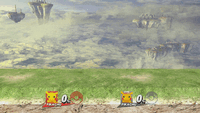
|
|---|
Taunts
- Up taunt: Hunches and discharges electricity around itself while saying "Piiiii!"
- Side taunt: Faces the screen and waves its left paw twice and then its right paw twice while saying "Pika Pika!"
- Down taunt: Rolls on its back while saying "Pikaaaaa!"
| Up taunt | Side taunt | Down taunt |
|---|---|---|
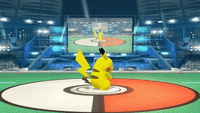
|
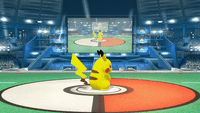
|
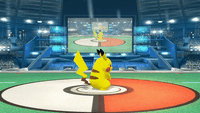
|
Idle poses
- Scratches its right ear.
- Stands up straight, then looks right, and then left, twitching its ears.
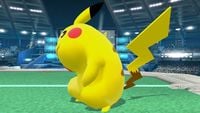 |
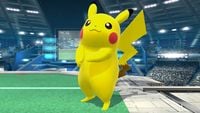
|
|---|
Crowd cheer
Victory poses
- Twitches its ears, then scratches its right ear.
- Jumps up and somersaults while saying "Pi!", then spins around once before happily facing the camera. It appears very similar to its "character chosen" animation in SSB.
- Sleeps on the ground while saying "Piiika" drowsily.
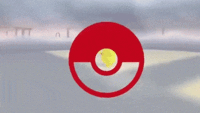 |
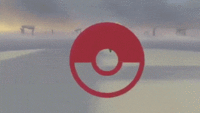 |
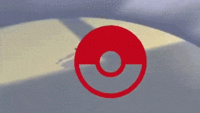
|
|---|
In competitive play
Official Custom Moveset Project
| Character | Custom sets available | ||||
|---|---|---|---|---|---|
| 1311 | 2311 | 2312 | 1312 | 1313 | |
| 1331 | 2313 | 2331 | 3311 | 1321 | |
Most historically significant players
See also: Category:Pikachu players (SSB4)
Captain L - The best Pikachu player in Canada and one of the best in the world. He notably placed 2nd at Arcane Tournaments 2018 where he scored his best wins in his career, being MkLeo and Mr.R. He also notably placed 9th at CEO 2018 and 13th at both 2GGC: MkLeo Saga and Smash 'N' Splash 4. He is ranked 79th on the PGR 100 as the second player to primarily play Pikachu.
ESAM - The best Pikachu player of all-time. He was the closest any Pikachu player came to winning a major, placing 2nd at Super Smash Con 2015 and The Big House 8. Additionally, he made multiple top 8s at other majors as solo-Pikachu such as 3rd at UGC Smash Open, 5th at DreamHack Atlanta 2018, and 7th at EVO 2015. He is the highest ranking Pikachu in the world, ranking 17th on the PGR 100.
Kishiru - The best Pikachu player in Japan. He placed 13th at Sumabato Smash 4 Final and made top 24s at many Umebura tournaments, placing 13th at Umebura 27 and 17th at both Umebura 32 and Umebura 33. He notably defeated Kameme at Umebura 34. Ranked 58th on the JAPAN Power Rankings.
Nero - The best Pikachu player in the Midwest. Known more for his regional performances, placing 7th at Midwest Mayhem 5, 13th Showdown: Battle Royale, and defeating players such as Ned and tyroy at other Midwest events. In terms of majors, he has a few notable top 64s under his belt with 33rd at Frostbite 2018 defeating K9sbruce and 49th at The Big House 7.
Rideae - One of the best Pikachu players in the United States. During 2017, he took sets over Nairo during his 17th place finish at Super Smash Con 2017 and Tweek during his 25th place finish at CEO 2017. In 2018, he very solid placements around his region of Florida, placing 13th at CEO 2018 and 17th at DreamHack Atlanta 2018.
Z - One of the best Pikachu players in the United States, residing in Las Vegas where he is considered a top 10 player there. He made top 64 at many majors during the lifespan of Smash 4, placing 17th at IBP Masters Showdown defeating AC, 25th at Paragon Orlando 2015, and 33rd at EVO 2018.
Tier placement and history
Pikachu was initially perceived as a top-tier character, thanks to its approach and mindgame potentials courtesy of Quick Attack, its strong combo game and edge-guarding potential, its ability to evade attacks courtesy of its small size and low crouch, and its jab lock set-ups into KOs. As each of these traits were demonstrated very effectively in competitive play by ESAM, Pikachu was ranked 5th on the first tier list. However, there was also a vocal fraction of players who did not agree on Pikachu's initial placement, mainly due to ESAM being the only notable Pikachu player who placed well in tournaments, which was insufficient enough in comparison to the significant results and representation of other well-regarded characters. Other criticisms included Pikachu's lack of reliable KO set-ups, its KO potential in general, the high landing lag of its aerials, and its poor range.
The debate over Pikachu's tier placement would become even more prevalent due to ESAM's results eventually declining due to the strengths of other well-regarded characters, as well as Pikachu's unfavorable matchups against Mario and Ness becoming more apparent. These criticisms were further exacerbated by Pikachu's representation still remaining fairly minimal for a high-tier character, and altogether resulted in its ranking on the first tier list being met with widespread disapproval. As expected, Pikachu's tier placement saw a noticeable drop on the second tier list, where it was ranked 12th. Despite ESAM placing at 3rd at UGC Smash Open, Pikachu's tier placement saw another drop, now being ranked 15th on the third tier list. Pikachu's results, while rare, have remained pretty strong nonetheless, which has allowed it to hold on the 15th placing on the fourth and current tier list.
In Solo Modes
All-Star Mode
In All-Star Mode, Pikachu is fought in Stage 5 in the 3DS version or Stage 3 in the Wii U version alongside Ness, Jigglypuff, Sheik, Ganondorf, Mewtwo, Charizard, Diddy Kong, and Cloud.
 Event Matches
Event Matches
Solo Events
- All-Star Battle: Regulars: Pikachu is one of the opponents fought in this event. All of the opponents are the eight starter characters of the "perfect-attendance crew" from Super Smash Bros.
- Fire-Type Frenzy: As Charizard, the player must defeat Pikachu, Greninja, and Lucario. Fire Bars, Fire Flowers, and Superspicy Curry are the only items that appear.
- Pokémon Battle: As Greninja, the player must defeat Pikachu, Charizard, and Lucario.
- When Lightning Strikes: A small Pikachu and must defeat three giant Pikachu.
- Yellow Devils: As Mega Man, the player must defeat a giant Pikachu, a giant Pac-Man, and the Yellow Devil in a Stamina Battle.
Co-op Events
- Pokémon Multi Battle!: Pikachu and Charizard must defeat a team of Lucario and Greninja, and then a team of Pikachu and Charizard each appearing after one opponent is defeated.
- The Ultimate Battle: Two players select a character and must defeat the entire roster.
Congratulations screens
3DS
Wii U
Trophies
Pikachu's default trophy is obtained by clearing Classic Mode as Pikachu. Its alternate trophy is obtained by clearing All-Star Mode as Pikachu in the 3DS version or purchasing it in the Trophy Shop for 1000G in the Wii U version (the latter can only appear after clearing Classic or All-Star as Pikachu). The Volt Tackle trophy is obtained only in the Wii U version by clearing All-Star Mode as Pikachu.
- Pikachu
Recognized the world over, Pikachu is an Electric-type Pokémon that stores energy in its cheeks for use in battle. In Smash Bros., Pikachu is a well-rounded fighter with speedy, powerful electric attacks. Quick Attack can be used twice in a row if two directions are input, one after another.
: Pokémon Red & Pokémon Blue (09/1998)
: Pokémon Yellow: Special Pikachu Edition (10/1999)
Pikachu is famous worldwide as the face of the Pokémon series. There's a lot of electricity stored in those rosy cheeks, and in this game, that allows for some devastating attacks, like Thunder Jolt. Tip: Input another direction after using Quick Attack to get a second burst. It's top-notch for recoveries!
: Pokémon Red/Blue (10/1999)
: Pokémon Yellow (06/2000)
- Pikachu (Alt.)
 Pikachu's Thunder Jolt fires off a ball of electricity that bounces across the stage, getting weaker as it travels. It does more damage to enemies in the air. The default down special, Thunder, causes a lightning strike that both shocks opponents and turns Pikachu invincible for a split second.
Pikachu's Thunder Jolt fires off a ball of electricity that bounces across the stage, getting weaker as it travels. It does more damage to enemies in the air. The default down special, Thunder, causes a lightning strike that both shocks opponents and turns Pikachu invincible for a split second. Pikachu's Thunder Jolt fires off a ball of electricity that bounces across the stage, getting weaker as it travels. It does more damage to enemies in the air. The default down special, Thunder, causes a lightning strike that both shocks opponents and makes Pikachu invincible for a split second.
Pikachu's Thunder Jolt fires off a ball of electricity that bounces across the stage, getting weaker as it travels. It does more damage to enemies in the air. The default down special, Thunder, causes a lightning strike that both shocks opponents and makes Pikachu invincible for a split second.: Pokémon Red & Pokémon Blue (09/1998)
: Pokémon Yellow: Special Pikachu Edition (10/1999)
Pikachu's Thunder Jolt fires off a ball of electricity that bounces across the stage, getting weaker as it travels. Airborne enemies will take extra damage from it and get launched further. The default down special, Thunder, causes a lightning strike that both shocks opponents and turns Pikachu invincible for a split second.
: Pokémon Red/Blue (10/1999)
: Pokémon Yellow (06/2000)
- Volt Tackle
Pikachu's Final Smash turns its whole body into a powerful ball of electricity that darts around at high speed, tackling opponents. While Pikachu is charging around, press the attack button to unleash powerful sparks. There's also a little ball of light that flies ahead of Pikachu itself. Use that as a guide if Pikachu seems out of control!
For Pikachu's Final Smash, it surrounds itself with a ball of electricity and darts around at high speed, tackling opponents. While it's charging around, press the attack button to unleash powerful sparks. You can also use the little ball of light that flies just ahead of Pikachu as a guide if it seems out of control!
Alternate costumes

| |||||||

|

|

|

|

|

|

|

|
Gallery
Pikachu's appearance during the Smash Direct.
Pikachu's amiibo.
Pikachu's appearance during E3 2013.
Using Thunder Jolt against Pit's Upperdash Arm.
Using Skull Bash on Bowser.
Alongside Kirby on Spirit Train.
Pikachu, Mario, Bowser and Pit on Pilotwings.
Alongside Mega Man.
Pikachu alongside Toon Link and Kirby.
Pikachu alongside Mega Man as he uses Rush Coil.
Alongside Donkey Kong as he uses Spinning Kong.
Trivia
- SSB4 is the first installment where Pikachu's teeth are visible. They can be seen when it is being grabbed by an opponent, or when it is hanging on an edge facing left.
- When Pikachu is stunned, its eyes appear as swirls. This is a reference to the Pokémon anime, in which Pokémon typically display the same expression after fainting.
- When Pikachu is put to sleep, its mouth can be seen animating with its snore.
- Pikachu knows six official Pokémon moves in SSB4, all of which it can learn legally in the Pokémon core series. In addition to Skull Bash, Quick Attack, Thunder and Volt Tackle, it can also use Thunder Wave and Thunder Shock as custom moves.
- Pikachu's pose in its official artwork for SSB4 is based on its front sprite from Pokémon Yellow, albeit completely facing the screen.
References
| Fighters in Super Smash Bros. 4 | |
|---|---|
| Veterans | Bowser · Captain Falcon · Charizard · Diddy Kong · Donkey Kong · Dr. Mario · Falco · Fox · Ganondorf · Ike · Jigglypuff · King Dedede · Kirby · Link · Lucario · Lucas · Luigi · Mario · Marth · Meta Knight · Mewtwo · Mr. Game & Watch · Ness · Olimar · Peach · Pikachu · Pit · R.O.B. · Roy · Samus · Sheik · Sonic · Toon Link · Wario · Yoshi · Zelda · Zero Suit Samus |
| Newcomers | Bayonetta · Bowser Jr. · Cloud · Corrin · Dark Pit · Duck Hunt · Greninja · Little Mac · Lucina · Mega Man · Mii Fighter (Mii Brawler · Mii Gunner · Mii Swordfighter) · Pac-Man · Palutena · Robin · Rosalina & Luma · Ryu · Shulk · Villager · Wii Fit Trainer |





